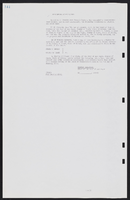Search the Special Collections and Archives Portal
Search Results

The Allegiant Stadium construction site along Dean Martin Drive, looking north-northwest in Las Vegas, Nevada: digital photograph
Date
2019-01-28
Archival Collection
Description
Photographed as part of the UNLV Special Collections and Archives' Building Las Vegas collecting initiative started in 2016. This photo series documents ongoing construction work at the Allegiant Stadium.
Image

Parking for construction workers at the Allegiant Stadium construction site, looking south-southeast in Las Vegas, Nevada: digital photograph
Date
2019-01-28
Archival Collection
Description
Photographed as part of the UNLV Special Collections and Archives' Building Las Vegas collecting initiative started in 2016. This photo series documents ongoing construction work at the Allegiant Stadium.
Image
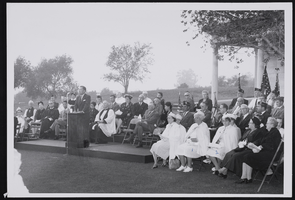
Augusta Schouten and Thelma Swanner representing the Desert Chapter of Gold Star Mothers at the Memory Garden Memorial Park service in Brea, California: photographic print
Date
1963-03-15
Archival Collection
Description
From the Nita Londo Rieger Photograph Collection (PH-00315).
Image
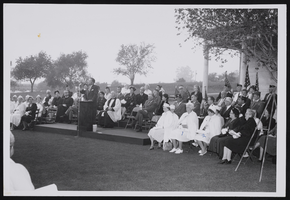
Augusta Schouten and Thelma Swanner representing the Desert Chapter of Gold Star Mothers at the Memory Garden Memorial Park service in Brea, California: photographic print
Date
1963-03-15
Archival Collection
Description
From the Nita Londo Rieger Photograph Collection (PH-00315).
Image

First annual Gay Pride parade lining up behind Flex Lounge, image 002: photographic print
Date
1997-05-10
Archival Collection
Description
Gay Pride 1997 (Dennis McBride, photographer) Gay Pride 1997 parade, lining up behind Flex Lounge at Charleston Boulevard and Arville. (5-10-97)
Image
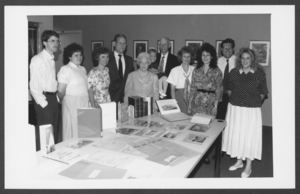
Photograph of UNLV reception honoring Elbert and Mary Edwards, Las Vegas, July 24, 1991
Date
1991-07-24
Archival Collection
Description
Description provided with image: "UNLV Special Collections Department reception honoring Elbert and Mary Edwards and the deposit of their manuscripts, books, and photographs in the Department's archives. Las Vegas Rotary Club also presented a $3,000 check to Mrs. Edwards for the Elbert Edwards Scholarship Fund at Boulder Humphrey, Judy Edwards, Keith Edwards, Mary Edwards, Rachel Davis, Mahlon Edwards, Carole Edwards, Donna Edwards Davis, Jeffrey Edwards, Jennifer Edwards." Mary Edwards is fifth from left.
Image
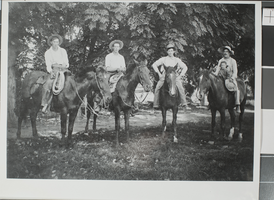
Photograph of men on horseback at Kiel Ranch, Las Vegas, June 30, 1924
Date
1924-06-30
Archival Collection
Description
A group of men on horseback at Kiel Ranch in Northern Las Vegas, Nevada. The Las Vegas Review Journal published this photo in their segment "Help Us Write History," and a reader responded with the following description: "Left: Francesco Barravecchio. Rider nest to left: Salvatore Bencivengo. Horseman - (second from RGT): Mario Lasalnullovo. Extreme Right: Pasquale Spensieri and 5 yr old daughter Filomrna. Photo taken: June 30th, 1924. Why: Summer Vacation." This document is included with the image.
Image
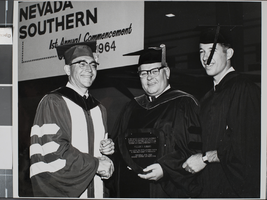
Photograph of Nevada Southern University Commencement, Las Vegas, June 03, 1964
Date
1964-06-03
Archival Collection
Description
The first commencement for Nevada Southern University (NSU). Pictured here include Governor Grant Sawyer; Dr. William Carlson, first dean of Nevada Southern; and Jon Cobain, President of the Class of 1964. Handwritten description provided on back of image: "N.S. 1st Commencement 6/3/64. Governer Sawyer congratulating William D. Carson, first dean and administrative head of Nevada Southern, upon being presented a plague of appreciation from the Class of 1964. Jon Cobain, President of the Class of 1964 on the right." Group Creators credit goes to Photo/Rama.
Image
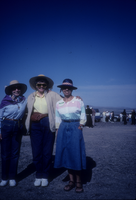
Slide of Sisters Rosemary Lynch and Klaryta Antoszewska standing with Christine Buismato at a demonstration near the Nevada Test Site, March 25, 1990
Date
1990-03-25
Archival Collection
Description
Color image (from left to right) of Sister Rosemary Lynch, Sister Klaryta Antoszewska, and Christine Buismato during a Franciscan weekend of peaceful demonstrations against nuclear testing.
Image
Pagination
Refine my results
Content Type
Creator or Contributor
Subject
Archival Collection
Digital Project
Resource Type
Year
Material Type
Place
Language
Records Classification

